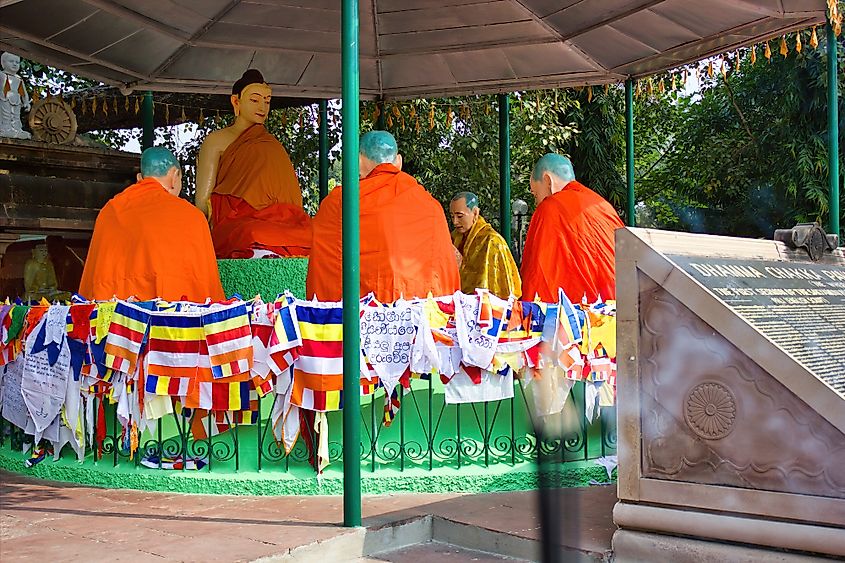
Buddhism
Buddhism is considered the 4th largest religion in the world that originated in Ancient India between the sixth and fourth centuries BCE. The religion is based on a series of teachings by Gautama Buddha. From India, Buddhism spread to major parts of Asia and the rest of the world. Currently, there are three major groups of Buddhism. These include the Mahayana Buddhism that is followed in the countries of China, Japan, Singapore, Taiwan, and Vietnam; the Theravada Buddhism that is followed in Cambodia, Laos, Myanmar, Sri Lanka, and Thailand; and the Tibetan Buddhism that is followed in Mongolia, Nepal, Tibet, Bhutan, parts of Russia and northern India. There are also many subsects of Buddhism like Nichiren Buddhism, Zen Buddhism, and Tendai Buddhism. The followers of Buddhism are referred to as Buddhists and at present, there are more than 535 million Buddhists all over the world.
Beliefs Of Buddhism

Buddhism consists of many traditions, beliefs, and spiritual practices that are as per the teachings of the Buddha. The principal goal of Buddhism is to escape from suffering and attain a state of enlightenment or Nirvana, thereby ending the continuous cycle of birth and rebirth. Buddhists believe that this path to enlightenment is through the practice and development of wisdom, morality, and meditation. The core teachings of Buddhism known as “dhamma” include the Three Universal Truths, the Four Noble Truths, and the Noble Eightfold Path. The Four Noble Truths are dukkha or suffering, samudaya or origin of suffering, nirodha or cessation of suffering and magga or the path to the cessation of suffering. The fourth Noble truth – magga thus refers to the steps which the Buddhists call the Noble Eightfold Path following which one can achieve enlightenment. The Noble Eightfold Path that is often represented by an eight-spoked wheel or “The Wheel of Dhamma” includes Right view (Samma ditthi), right intention (Samma sankappa), right speech (Samma vaca), right action (Samma kammanta), right livelihood (Samma ajiva), right effort (Samma Vayama), right mindfulness (Samma Sati), and right concentration (Samma samadhi).

Buddhists also believe in the cycle of rebirth, where souls are born again and again into different bodies which are dependent on “karma” or how well one conducts themselves in their past lives. The Theravadins believe that every individual takes rebirth within one of the six realms – animals, demi-gods, heavenly, hellish, humans, and hungry ghosts. There are many religious texts and scriptures written in Pali that are revered by the Buddhists. These include the Tipitaka, Mahayana sutras, Tantric Texts, Abhidharma, and the early Buddhist texts.
Brief History Of Buddhism

As per the early Buddhist discourses, about 2500 years ago, the historical Buddha - Siddhartha Gautama was born as a son of King Suddhodana and Queen Maya in the southern part of the Lumbini region of present-day Nepal. It is believed that the young Prince spent his early life in the ancient city of Kapilavastu. At a very early age, Siddhartha was moved by the harsh realities of life and sufferings in the world. At the age of 29, Prince Siddhartha Gautama decided to give up his luxurious and comfortable life in the palace and live an ascetic life. It is believed that Siddhartha saw four sights: a sick man, an old man, a dead body, and a holy monk. Disturbed by this sight, Siddhartha became a monk and after many years of intense meditation, praying, and fasting, he decided to pursue the “Middle Way” – a balanced life without social indulgences and deprivation. Buddhists believe that while in deep meditation under a Bodhi Tree in the town of Bodh Gaya in the Indian State of Bihar, Siddhartha attained “Enlightenment or Nirvana” and came to be known as “Buddha” or the “Enlightened One”.

For the next 45 years, Gautama Buddha preached his sermons to his followers and disciples about how to achieve nirvana. After Buddha’s passing around 438BC, his followers started a religious movement based on Buddha’s teachings that would eventually develop into Buddhism. The Mauryan Emperor Ashoka the Great in the 3rd century BC, declared Buddhism as the state religion. During this period, several Buddhist monasteries were built and over the next few years, Buddhism began to spread beyond the boundaries of India into the other parts of the world.
Buddhism Today

Currently, more than 535 million people all over the world, accounting for over 7% of the world’s total population are followers of Buddhism, with a majority of the Buddhists being found in the countries of China, Thailand, Japan, Myanmar, Sri Lanka, Vietnam, Cambodia, South Korea, India, Malaysia, Taiwan, Laos, United States, Nepal, and Indonesia.
China has the largest Buddhist population in the world with about 244,130,000 Buddhists living in the country. The world’s second-largest Buddhist population is found in Thailand with about 64,420,000 Buddhists living there. Japan has the third-largest Buddhist population with 45,820,000 Buddhists.
The other nations which contain a significant population of Buddhists include Myanmar (38,410,000), Sri Lanka (14,450,000), Vietnam (14,380,000), Cambodia (13,690,000), South Korea (11,050,000), India (9,250,000), Malaysia (5,010,000), Taiwan (4,950,000), Laos (4,100,000), United States (3,570,000), Nepal (3,080,000), and Indonesia (2,062,150).
10 Countries With The Highest Number Of Buddhists
| Rank | Country | Estimated Buddhist population (2010) | % of world Buddhist population |
|---|---|---|---|
| 1 |
China |
244,130,000 |
50.1% |
| 2 |
Thailand |
64,420,000 |
13.2% |
| 3 |
Japan |
45,820,000 |
9.4% |
| 4 |
Myanmar |
38,410,000 |
7.9% |
| 5 |
Sri Lanka |
14,450,000 |
3.0% |
| 6 |
Vietnam |
14,380,000 |
2.9% |
| 7 |
Cambodia |
13,690,000 |
2.8% |
| 8 |
South Korea |
11,050,000 |
2.3% |
| 9 |
India |
9,250,000 |
1.9% |
| 10 |
Malaysia |
5,010,000 |
1.0% |











